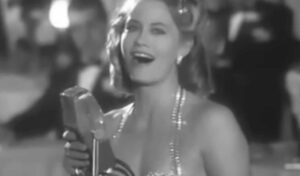Of all of the songs ever performed in the history of cinema, “Cheek to Cheek” ranks #15, according to the American Film Institute. That’s how good it is.
It was written by the legendary Irving Berlin, who already made my list with the song, “What’ll I Do,” #37 on our list of the 52 Greatest Love Songs Ever.
Here’s how Berlin wrote songs:
- He pecked out a melody on the piano.
- Then he added the chords.
- Then he added the lyrics.
He was a one-man show: music and lyrics, in that order. But the words and the notes go so well together that you can’t imagine either standing alone without the other. But they do.
Let’s start with the first word in the song: heaven. That’s the place where we find ourselves when we fall in love. Everything is right with the world. Our problems melt away. We feel we can take on the world, because we’re above the world … we’re in heaven!
Check out these great lyrics:
“Heaven, I’m in Heaven,
And my heart beats so that I can hardly speak;
And I seem to find the happiness I seek,
When we’re out together dancing, cheek to cheek.”
Berlin wrote this song for the great Fred Astaire in his movie musical, “Top Hat.” What an opportunity for a songwriter! Fred Astaire will not only sing your song, but he’ll dance to it with (drum roll) … Ginger Rogers!
Watch the video below to see art at a very high level.
Fred Astaire sings “Cheek to Cheek”
Berlin and Astaire represent a unique breed. Both were artists operating at a very high level. But they achieved their status through hard work, because they were craftsmen. By that, I mean that they fussed over every little detail until their finished work of art was impeccable.
Fred Astaire makes dancing look so easy. It’s not. (At least I don’t think so.)
Irving Berlin’s simple formula makes songwriting look easy. It’s not, not if you want to create a true work of art.
“Cheek to Cheek” is a song that begs to be enjoyed while on a dance floor. But it is a song that you’ll revel in by just listening.
Contemporary music artists like Lady Ga Ga, Tony Bennett, and Diana Krall have all covered this song in their own imitable styles. Take a listen.
Lady Ga Ga and Tony Bennett sing “Cheek to Cheek”
Diana Krall sings “Cheek to Cheek”
We think of Heaven as a place of love, because we reside in the presence of God, who is Love. A song like “Cheek to Cheek” allows us to get a little foretaste of the Hereafter through the power of a love song.
Beautiful.
What else is beautiful? Life itself. Beautiful love songs are potent medicine for the culture of death that overtook our country over the past half century through abortion.
Spread the love. Share these songs. And share your fruitfulness with your gift to Pulse Life Advocates today.
Planned Parenthood describes the abortion pill (mifepristone and misoprostol) as a “safe and effective way to end an early pregnancy.”
Their website goes so far as to call it “very safe,” asserting that it is safer than penicillin, Tylenol, and Viagra. They double down by claiming “serious problems are rare.”
Is this really true?
Is the abortion pill really safer than a wildly popular medicine like Tylenol? Let’s take a closer look, beginning with acetaminophen.
An Ai search reveals 23% of American adults use some form of Tylenol (acetaminophen-containing medicines) on a weekly basis. That’s something like 52 million people.
Even more, Harvard Health reports that these adults consume billions of doses of acetaminophen safely each year. But people occasionally end up in the emergency room, typically after accidental overdoses.
The U.S. National Library of Medicine states that acetaminophen is relatively safe at therapeutic doses. In other words, a single Tylenol pill isn’t going to put you in the hospital. Misuse can, as the drug accounts for 56,000 emergency room visits, 2600 hospitalizations and 500 deaths annually out of in “excess of 25 billion doses being used annually as a nonprescription medication.” [SOURCE: National Library of Medicine.]
Now let’s look at the abortion pill.
“Medication abortion accounted for 63% of all U.S. abortions in 2023 — an increase from 53% in 2020,” according to the pro-choice Guttmacher Institute.
The abortion pill came onto the U.S. market in 2000 following ten clinical trials involving 30,966 women. Less than half a percent (.5%) reported any severe adverse reactions.
Contrast that with acetaminophen with but a .0000001 hospitalization rate from overdosing on the medication vs. .5% from injesting a single dose of the abortion pill.
But the disconnect between reality and the fiction promoted by Planned Parenthood gets worse. The FDA’s testing protocols have been called into question by the Ethics & Public Policy Center.
They commissioned a study using a sample size nearly 28 times of the original FDA study, based on mifepristone abortions from 2017 to 2023.
The new results, based on a study of 865,727 users of the abortion pill, revealed the FDA dramatically understated adverse reactions to the pill. Their press release recaps the results:”
The study shows that, following a mifepristone abortion, 10.93 percent of women experience sepsis, infection, hemorrhaging, or another serious or life-threatening adverse event. That is, over one in ten patients experience at least one serious adverse event.”
Even the original FDA data dispelled the myth that the abortion pill was safer than Tylenol. EPPC’s new study is a wake-up call to the shocking danger it presents to at-risk women who believe it to be safe.
In light of this study, the abortion pill should be removed from the marketplace to protect women’s lives. It is unconscionable for it to be dispensed via the U.S. Postal Service without a medical exam from a licensed physician.
Sinatra said that “Something” was the best love song written in the last fifty years. He should know, as he crooned all of the best of the genre in his storied career. George Harrison’s moving love song rivets us with the first verse:
“Something in the way she moves,
Attracts me like no other lover,
Something in the way she woos me …”
Harrison captures the ineffable quality of love in these few words. It’s as if God sprinkles angel dust on two people allowing them to sense something lovely about the other that they don’t sense from anyone else. This is how romance begins.
George Harrison composed songs in the shadow of his Beatle bandmates, John Lennon and Paul McCartney, who penned most of the group’s hits. “Something” made the cut for the last album the Beatles recorded, Abbey Road, in 1969. (Although their Let It Be album was actually released in 1970, after Abbey Road.)
Even the cranky John Lennon acknowledged it was the best song on the album. Why? A classic melody and soulful lyric. The second verse presents an unexpected prelude to Christian love:
“Something in her smile, she knows
That I don’t need no other lover … “
Sinatra sings “Something”
True love is monogamous, married love. That certain ‘something’ that attracts us “like no other lover” sets the stage for deeper, sacrificial, love that grows with time, nurtured by Christ’s profound example.
Harrison embraced the Hare Krishna religion. But “Something” flirts with a Christian ethos by suggesting commitment.
The song’s bridge puts a pause on the romance for a minute by asking, “Will my love grow? I don’t know, I don’t know.”
It’s a fair question, because love usually needs some time to season as the first blush of romance subsides. Love is commitment, not just feelings. And “Something” resolves the question in the final chorus:
“I don’t want to leave her now,
You know I believe and how.”
What is the word that stands out in this last phrase? To me, it’s ‘believe.’ The dictionary says to believe means:
“To have confidence in the truth, the existence, or the reliability of something, although without absolute proof that one is right in doing so.”
We believe in God, who IS love Itself, but ultimately this belief is a leap of faith, a choice.
“Something” echoes those sentiments, but in a different way. The songwriter believes in his lover, and makes the choice to stay, to commit to the relationship.
So many of the songs in my countdown of the 52 Greatest Love Songs Ever overwhelm through the sheer emotive-inducing beauty of the union of words and music. But ultimately, love comes down to a choice, not mere emotion.
“Something” conveys the power of love with the poet’s touch. Well, done, George Harrison!
This is the third and final song written by a member of the Beatles to make my list. (Paul McCartney’s “Silly Love Songs” was #52 and Lennon/McCartney’s “And I Love Her” was #48.) Next week presents the second entry to my list by another legendary songwriter, a love song that begs you to take your lover in your arms … and dance. Til then, remember that love is the antidote to abortion. If you spread the love by sharing this blog series with your friends, you’re taking a tangible step to creating a culture of life. What are you waiting for?
Here’s how to do it:
Text or email a friend with the link to this post. Write these words: “I’m really enjoying this series. I think you will, too.” Then hit send. You’ve just spread a little love and cultivated a culture of life.
One last thing: Pulse Life Advocates works overtime standing up for our unborn brothers and sisters. They can’t continue without your financial support. So take a minute right now and make a gift to Pulse, regardless of the size of the gift.
Thank-you.
The intro of “My Girl” immediately grabs, as the bass guitar plays, “bap boom boom, bap boom boom, bap boom boom …”
Then a clean electric guitar riff pipes in, “twoink … twoink twoink twoink twoink twoink twoink … as the singers snap their fingers.
Totally cool, and the singing hasn’t even started! But the intro has you on the edge of your seat for what comes next.
The song was written by one of Motown Records’ greatest artists, Smokey Robinson, and his collaborator, Ronnie White. But it wasn’t Robinson and his group, Smokey Robinson & The Miracles, that made it a big hit. It was the Temptations, another group in the Motown family.
The R & B sound of the sixties
This vocal quintet defined that cool R&B sound of the sixties and seventies with their sartorial splendor, crisp choreography, and luxurious harmonies. But it was the group’s lead tenor, David Ruffin, who took the song over the top with his compelling, soulful vocals.
Smokey said he wrote the song with Ruffin’s vocal prowess in mind:
“I knew David Ruffin was in that group. See, David Ruffin had one of those demanding baritone, tenor voices. I said, if I can get David to sing something sweet, the girls are going to love it.”
He was right. And the guys loved it, too. Ruffin’s self-assured vocal stylings were smoothed over to refine his usual raspiness and produce one of the sweetest songs of the decade.
“My Girl” was The Temptations first #1 hit (in 1965) and Motown’s first #1 on the Hot 100 list.
Everything works with this song, beginning with the lyrics that appeal to young love, a delightful feeling one never shakes. The song’s classic intro sets the stage for verse one’s wonderful feel-good lyrics:
“I’ve got sunshine on a cloudy day,
When it’s cold outside, I’ve got the month of May.
I guess you’d say,
What can make me feel this way?”
And you know the answer: “My girl!”
Great intro. Great lyrics. Great melody. Great vocals and arrangement. Everything works.
A creative era
The 1920s and the 1960s were the two most creative decades of the twentieth century musically. Economic prosperity created demand for ‘product,’ and sheet music publishers (in the 1920s) and record labels (in the 1960s) gave songwriters more creative license than they have today.
Immigration from Europe in the 1920s ushered in a creative potpourri of music styles into America, very much defined by Jewish talent. At the same time, Harlem spawned the ‘jazz age.’ America was awash in creativity.
Four decades later, the Baby Boom generation began to come of age in the 1960s, and youth are the drivers of so much innovation. Elton John said artists in the 1960s were driven by love of music more than monetary gain. Unsurprisingly, love songs from the 60s are disproportionately represented on this list. The decade produced not only a lot of good music, but a lot of varied music.
“My Girl” is a direct descendant the rich musical heritage born in 1920s Harlem (New York), blossoming in Detroit, Michigan under the Motown Records label in the 1960s. The sound was a fusion of soul, R&B, gospel, and vocal jazz.
The Temptations, in collaboration with Smokey Robinson and Ronnie White, created an iconic love song with a sound unlike any other on this list. Interestingly, Smokey Robinson had another #1 hit a year earlier, “My Guy,” a song that was the perfect bookend to “My Girl.”
“My Guy”
Although it didn’t make my list of top 52 love songs, “My Guy” deserves honorable mention by making the case for commitment in a relationship with this memorable first verse:
“Nothing you could say could tear me away from my guy,
Nothing you could do, ’cause I’m stuck like glue to my guy,
I’m sticking to my guy like a stamp to a letter,
Like birds of the feather, we stick together,
I’m tellin’ you from the start, I can’t be torn apart from my guy.”
Listen to Motown’s Mary Wells sing it:
This blogger could do an entire series on just the love songs released by Motown in the 1960s, songs like these:
“You Can’t Hurry Love” by the Supremes
“Take This Heart of Mine” by Marvin Gaye
“I Was Made to Love You” by Stevie Wonder
“Tracks of My Tears” by Smokey Robinson and the Miracles
Some of the best love songs of the century
The Sixties were a crazy time with Vietnam war protests, the Second Vatican Council, LSD, hippies, rock and roll, and The Pill. Out of it flowed some of the best love songs of the century. As I’ve said before, love songs are really God songs, because God IS love. God was certainly in the midst of that chaotic era, and musicians came through with a bevy of timeless tunes.
You’re probably asking yourself, “Is there any way they can top this week’s love song?” The answer is yes. Just check back with an even better love song, also written in the 1960s.
Why in the world is Pulse creating this series of the “52 Greatest Love Songs Ever?” Because love is the antidote to abortion. Spread the love. Subscribe to our blog and spread the word to your friends.
[Are you enjoying this series? Then donate to Pulse’s pro-life student scholarship fund and spread the love.]

Catholic Foundation executive director, Sue McEntee (left) and Bishop William Joensen (right) present Pulse executive director, Maggie DeWitte, and board president, Tom Quiner, with a grant.
Pulse Life Advocates was the proud recipient of a grant from the Catholic Foundation of SW Iowa last week. The $4500 grant will be used to purchase teleconferencing equipment, allowing Pulse to connect with pro-lifers throughout the state of Iowa in more substantial ways.
First up are quarterly meetings with Respect Life Group point persons in Catholic parishes throughout the southwest Catholic diocese. We held our first meeting last quarter in our West Des Moines offices attended by local pro-lifers.
Thanks to this grant, we can connect with parishes throughout the diocese whose representatives can’t make the long drive to Des Moines.
Quarterly meetings allow us to keep pro-lifers throughout the state in the loop on what is happening in pro-life circles, the legislature, and the churches. These meetings allow pro-lifers to share what they’re doing in their local communities to promote a culture of Life. They inspire creative thinking in our movement by hearing what’s working in other churches.
Our next meeting takes place on Monday, July 21st at 6PM at Pulse’s West Des Moines office. Hopefully, our new teleconferencing system will be installed by then to allow us to reach groups and persons throughout the diocese.
Our long term goal is to connect with pro-life point persons for churches throughout the entire state of Iowa.
Would you like to be included in these meetings? Simply email Sarah Schiltz at sschiltz@pulseforlife.org to get your name added to our list.
Thanks again to the Catholic Foundation of SW Iowa for making this investment possible.
Younger readers will think “Cry Me a River” was written by Justin Timberlake in 2002. It’s better to say he ripped off Arthur Hamilton’s song title of the same name. Mr. Hamilton composed his song in 1953 and created a catch phrase that is still used seven decades later.
He described how he came up with the idea:
“I had never heard the phrase. I just liked the combination of words… Instead of ‘Eat your heart out’ or ‘I’ll get even with you,’ it sounded like a good, smart retort to somebody who had hurt your feelings or broken your heart.”
Like two earlier entries on this list (“Stormy Weather” and “I’ve Got It Bad, and That Ain’t Good”) this song falls in the category of a torch song. It’s about a relationship gone bad because of one party’s infidelity. And now he (she?) regrets it:
“Now you say you’re sorry for being untrue,
Well, you can cry me a river, cry me a river,
I cried a river over you.”
Yes, indeed, what a poetic way of saying, ‘eat your heart out, chump!’
A phrase like the former says so much more than the latter. Good work, Arthur Hamilton! (As of this writing, the 98 year old Mr. Hamilton is still with us!)
Julie London made the song a hit in 1955:
Now we turn to Mr. Timberlake’s sorry rip-off. It’s a different song, using Timberlake’s inartful lyrics, repetitive vocal line, and irritating electronic riffs (am I showing my age?). It sticks with Arthur Hamilton’s theme of a lover who has cheated on you.
So what does Timberlake do about it? In the music video below, instead of crying a river of tears, he breaks into the ex-girl friend’s house, has sex with his new girl friend as revenge, and smugly departs. Here it is. Feel free to skip it:
Justin Timberlake’s “Cry Me a River”
For the record, Timberlake wrote this song as a rebuke to former girlfriend Britney Spears after their split. Ms. Spears in return asserts in her book that Timberlake forced her to abort the child he fathered with her.
The Roe v Wade generation was corrupted by that awful decision and they don’t know how to write a decent love song.
Contrast Timberlake’s efforts with those of Diana Krall, who covers Arthur Hamilton’s song.
Diana Krall sings “Cry Me a River”
No comparison.
Lost love hurts like hell. That’s why good song writers can tug at our heartstrings. “Cry Me a River” is an outstanding entry to our list of the 52 Greatest Love Songs Ever.
We’re counting down these songs because love is the antidote for abortion, and abortion hurts like hell. The mom. The dad. The baby. The grandparents. The Aunts. The Uncles. The Sisters. The Brothers. The village. The state. the country. the world. ALL of them, ALL of us, are hurt by every single abortion.
Abortion is the denial of love. It is violence against the innocent. It hurts like hell because it is hell, and Satan cheers every single abortion.
Let’s spread a little love today. Share this song. Subscribe to our blog and share our posts on social media.
If you’re a little shy about talking about pro-life matters, simply start sharing these posts. Who doesn’t like a good love song (other than Satan!).
I just looked ahead to next week, and I guarantee: you’re going to love #32 on our list.
In the meantime, help Pulse keep this series going. Support us with your gift today. Thank-you.
By Tom Quiner
Lionel Richie was perhaps the finest American balladeer of the late 20th century. His songs were romantic, combining irresistible melodies with romantic lyrics focused on the human condition. “Hello” was a 1984 #1 hit single that was one of his best.
Richie was the last great writer of pop love songs before the Roe v Wade generation took over in the 90’s and essentially abandoned the genre. Only two songs on my list were written more recently than “Hello” and only by a couple of years.
His lyrics grab you instantly, accompanied as they are by a melody in a brooding minor key:
“I’ve been alone with you
Inside my mind.
And in my dreams I’ve kissed your lips
A thousand times.
I sometimes see you pass outside my door …
Hello! Is it me you’re looking for.”
Good stuff! I love the way he rhymes the last line of the verse with the first line of the refrain. How many people have ever had a crush, perhaps a very deep crush, on someone without having any idea if the feelings were reciprocated?
This is the essence of life
 This is the essence of the adventure of living a life fully alive, as our hearts long to love, and be loved in return.
This is the essence of the adventure of living a life fully alive, as our hearts long to love, and be loved in return.
When love is returned, the circuit is complete and power and meaning flows into everything we do. Let’s say you have a repetitive, boring job. Let’s say you wash dishes (as I did in my teens), the boredom is so much easier to manage when your loved one is alone with you inside your mind.
Of course, the circuit is always complete, married or single, if we simply let God into our lives. God is at the heart of every love song, because God IS love. Sadly, we often block God.
Who is doing the whispering?
Sometimes the words you hear in your mind …
“Hello, Is it me you’re looking for?”
… may be GOD whispering in YOUR ear trying to get your attention. That wasn’t Richie’s intent. He writes about romantic love, as he said in an interview:
“I write about love. It’s non-political, simple and universal. ‘I love you’ are the corniest three words you’ll ever use, but the whole world is looking for it and can’t wait for someone to say it to you.”
This observer humbly disagrees with the maestro’s assertion that the words “I Love You” are corny. Nothing could be further from the truth. Love is anything but banal or merely sentimental. It is the foundation of our existence. Jesus spelled it out in Matthew 22:37-39:
“Thou shalt LOVE the Lord thy God with thy heart, and with all thy soul, and all thy mind. This is the first and great commandment.” (Emphasis added.)
But that’s not enough. Jesus continues:
“… Thou shalt LOVE thy neighbor as thyself.”
Twelve centuries later, St. Thomas Aquinas built on this last sentence. To ‘love’ is to will the good of the other, or in other words, to love like God loves. Abortion is the antithesis of love, especially when the unborn are realized as our tiny neighbors growing and thriving in their mother’s wombs.
Love is more than a feeling
Contemporary songwriters present love as a feeling or an urge. It’s so much more. One of the most poetic explanations for what love is came from the novel, “Captain Corelli’s Mandolin,” by Louis de Berniéres. Contemplate his words.
“Love is a temporary madness.
It erupts like volcanoes and then subsides.
And when it subsides, you have to make a decision.
You have to work out whether your roots have so entwined together
that it is inconceivable that you should ever part.Because this is what love is.
Love is not breathlessness,
It is not excitement,
It is not the promulgation of eternal passion.
That is just being “in love” which any fool can do.
Love itself is what is left over when being in love has burned away,
And this is both an art and a fortunate accident.
Those that truly love, have roots that grow towards each other underground,
And when all the pretty blossoms have fallen from their branches,
They find that they are one tree and not two.”
You can watch these words performed (not verbatim) in the scene below from the movie by the same name with John Hurt and Penelopé Cruz:
What Lionel Richie gets right, as does Paul McCartney (“Silly Love Songs,” #52 on our list) is people LOVE love songs. Richie wrote a slew of wonderful love songs, including “Endless Love,” “Say You, Say Me,” “Truly,” “Lady,” and “Three Times a Lady” to name a few.
Among these, “Hello” holds a special place.
As this countdown continues, be sure to let me know what are your favorite love songs? Leave your picks in the comment box below.
Next week, we’ll take a look at a song written shortly after I was born by a songwriter you probably don’t know, who is still alive as of this writing at the tender age of ninety-eight. But you’ll probably know the phrase he coined, because Justin Timberlake stole it! Til then, continue to bask in the love. Remember, love is the antidote to abortion.
And if God whispers in your ear today, “Hello, is it me you’re looking for?” … what will your answer be?
[Be honest, are you enjoying this series? Then support Pulse with your gift. Spread the pro-life love!]
As if you need any additional motivation to attend this Saturday’s Iowa March for Life, we’re excited to announce that Jennie Bradley Lichter will be speaking! She is President of the March for Life Education and Defense Fund. Ms Lichter replaced Jeannie Mancini who ran the March for Life for the previous dozen years.
Check out her bio:
“As a longtime Marcher who began attending the National March as a college student in 2001, Jennie is humbled and honored by the opportunity to lead the March for Life. Jennie has wide-ranging legal and policy experience in the public, private, and nonprofit sectors, including at the highest levels of the federal government. During the Trump Administration, Jennie served in the White House as a Deputy Assistant to the President and Deputy Director of the White House Domestic Policy Council (DPC) where she supervised rulemaking and policy efforts implicating a number of federal agencies, and led policy initiatives across the federal government to defend the dignity of life.
Prior to her White House service, Jennie worked on policy issues and federal judicial (including Supreme Court) confirmation efforts in the Office of Legal Policy at the U.S. Department of Justice. She previously served as in-house counsel for the Archdiocese of Washington. Early in her legal career, Jennie clerked for two federal appeals court judges and was an associate at the international law firm Jones Day.
Jennie formerly served as the Deputy General Counsel at The Catholic University of America. In addition to her legal work at Catholic University, Jennie also founded and directed The Guadalupe Project, the University’s campus-wide initiative to support and lift up pregnant and parenting students, staff, and faculty. She was a Fellow at the Center for Religious Liberty in the University’s Columbus School of Law.
Jennie graduated from the University of Notre Dame and from Harvard Law School, and earned an M.Phil in Theology & Religious Studies from the University of Cambridge in the UK. She and her husband, Brian, have three young children who love attending the March for Life.”
Join us this Saturday, June 21st, at the Iowa State Capitol Rotunda.
Schedule:
Noon to 1: Educational Booths & Music
1PM: Rally
1:45: March for Life
Be there.
By Tom Quiner
This soulful aria is but one of the many dazzling songs from West Side Story, with music by Leonard Bernstein and lyrics by Stephen Sondheim. “Maria” is a song about that first blush of young love. Our protagonist, Tony, sings with joy at learning the name of his love-interest. Watch Ansel Elgort sing it above from Steven Spielberg’s 2021 film remake of the original.
There’s power in a name. I have a friend who makes it a point to learn … and use … the name of everyone she meets, whether if it’s the cashier at the super market or the barista at the coffee shop. They in turn learn her name and suddenly there’s a bond.
When it comes to young lovers, the mere utterance of his or her name is like a rhapsody. To that end, Mr. Sondheim milks the power of a name by invoking Maria’s name not once, not twice, but thirty times in a song with but 123 words. That’s about a quarter of the entire lyric!
Richard Beymer sings “Maria” from the original 1961 movie
Interestingly, God told us via the prophet, Isaiah, that he knows us by name:
“I have called you by name, you are mine.” [Isaiah 43:1]
That’s pretty awesome considering there are 8 billion people in the world!
Even more, God knew us when we were yet unborn, as the Psalmist told us:
“For you formed my inward parts; you knitted me together in my mother’s womb.” [Psalm 139:13]
Even though the Jewish born Stephen Sondheim didn’t seem to practice his faith, he seemed to understand the biblical principal that if our name matters to God, who IS love, then our name matters very much to our lover who basks in the glow of its sheer beauty.
 Sondheim’s relentless repetition of Maria’s name captures the primal desire of love, catapulting this powerful song to #35 on my list of Greatest Love Songs Ever. Imagine that: out of millions of songs written down through the ages, this one ranks thirty-fifth by invoking the beautiful name of the Mother of God 30 times (a very Trinitarian number, just to make small talk).
Sondheim’s relentless repetition of Maria’s name captures the primal desire of love, catapulting this powerful song to #35 on my list of Greatest Love Songs Ever. Imagine that: out of millions of songs written down through the ages, this one ranks thirty-fifth by invoking the beautiful name of the Mother of God 30 times (a very Trinitarian number, just to make small talk).
Leonard Bernstein does something interesting musically in the song. He opens it using a tritone.
If you listen to Tony sing Maria the first time, that’s a tritone interval. Common intervals are a 4th (C to F, for example) or a fifth (C to G). The tritone splits the difference (C to F#). Very cool.
Bernstein used the interval to great effect throughout West Side Story, and most notably on “Maria.”
Julian Ovenden of Downton Abbey fame sings “Maria”
In my previous entry (“Blue Moon”), I made a cryptic remark about a Broadway legend who is the ‘bizarro’ version of Oscar Hammerstein II. That legend, of course, is Stephen Sondheim.
The young Stephen Sondheim grew up living next store to the great Hammerstein. Hammerstein took Sondheim under his wing, mentoring him on how to write and produce a musical. Sondheim looked at him as something of a father figure.
Their lyrical styles were polar opposites. Where Hammerstein was sweet and sentimental, Sondheim was sardonic. Hammerstein lyrics tended to be sunny; Sondheim’s dark. What they had in common, though, was an ethic that fussed over every song, every lyric, every word, and even every syllable.
Sondheim could say a lot with few words, as this line from Maria shows:
“Maria, all the beautiful sounds of the world in a single word.”
Nice.
This is a love song that makes you feel young and alive. Kudos to the team of Bernstein and Sondheim.
I peeked ahead to next week and notice we have song that is one of the most contemporary ones on this list, and yet it was written 38 years ago! Perhaps this a reflection of your humble curator’s age! Whatever, check back in seven days. Spread the word to your friends, for love is the antidote for abortion. The world needs to take a slow breath and listen to more of these songs!
[If you are enjoying this series, support Pulse with your gift today to keep it going.]
By Tom Quiner
Even younger readers are familiar with Rodgers and Hammerstein. But few knew that Lorenz Hart was Richard Rodger’s lyricist before Oscar Hammerstein II. Hart’s lyrics had a different feel, as showcased in “Blue Moon,” #36 on our list of Greatest Love Songs Ever.
Hammerstein’s lyrics tend to be sentimental; Hart’s are witty. The most memorable musicals were those written by Rodgers and Hammerstein. But jazz musicians are more likely to perform songs from the Rodgers and Hart songbook than Rodgers and Hammerstein’s.
Blue Moon enjoys different treatments from different artists, a sign of a great song. For instance, listen to Frank Sinatra’s cover (above) of the song from his 1961 “Swinging Session!!!” album. This is the Sinatra style I love most, refined by another classic arrangement by the great Nelson Riddle. By way of contrast, listen to the doo-wop version performed by Sha Na Na in the 1978 movie version of Grease:
Sha Na Na sings Blue Moon
I was recently at Des Moines’ Noce Jazz Club, and the jazz group that night performed the classic “My Funny Valentine” with lyrics by Lorenz Hart. Think about it: Richard Rodgers wrote music using two different lyricists, but the songs with Hart’s lyrics are the ones you hear performed the most in jazz clubs. Why?
Some think it’s because the nature of musicals changed. Musicals at the time Hart was penning the lyrics with Rodgers (1919 – 1943) were about the song. Musicals at the time Hammerstein partnered with Richard Rodgers (1943 – 1959) were about the story first. The songs’ roles were to advance the storyline … perhaps at the expense of the song itself?
Lorenz Hart was simply a genius when it came to lyrics. He was a tortured soul, a hopeless alcoholic who fought depression, and was believed to be a closet homosexual in an era when a label like that could crush a career.
He poured his pain into his beautifully crafted lyrics. His words were often playful, while providing a glimmer of the vulnerability lurking between the lines. Like Irving Berlin, his lyrics were impeccably crafted, often using clever rhymes and even interior rhymes.
Fourth time is the charm!
In the case of Blue Moon, Richard Rodgers wrote the melody for a 1933 MGM musical. Hart added the lyrics, but the song ended up being scrapped.
Rodgers pulled out the melody two more times in future movie projects, with Hart dutifully adding a complete new set of words each time. And still, the studio didn’t use the song.
Third time wasn’t the charm!
But the fourth attempt finally produced pay dirt, with the new title of “Blue Moon.” Richard Rodger’s timeless melody and Lorenz Hart’s yearning lyrics meld into a unified expression of what life is about: an endless search for love … until we find it (or it finds you). The opening verse sets the stage:
Blue Moon,
You saw me standing alone,
Without a dream in my heart,
Without a love of my own.
Love is always about God, because God IS Love. The secular Mr. Hart unwittingly acknowledges this truth with the next verse:
Blue Moon,
You knew just what I was there for,
You heard me saying a prayer for,
Someone I really could care for.
The song’s story unfolds as the prayer is answered with the delirious beauty that makes the love song the artist’s ultimate pallet for expressing our deepest longings.
Blue Moon says so much with such simplicity. It takes the artistry of the masters to pull such a feat off, for simple (and good) love songs are difficult to write. Blue Moon has a simple, accessible melody line featuring classic chord progressions that begs to be sung. Indeed it has, by top artists for nine decades. It even pops up on televisions shows from time to time, as you can see in this fun clip from the 1980s series, “Moonlighting”:
Cybil Shepherd sings “Blue Moon” on the TV series, Moonlighting
We’ll be back next week with another Broadway love song with lyrics by a musical theater legend who could be described as the ‘Bizarro’ version of Oscar Hammerstein.
In the meantime, tell your friends about this series. Seriously. We’re trying to spread a little love, because love is the greatest antidote to abortion. Be sure to subscribe to our blog. And if you’re really feeling good after listening to this great love song, make a donation to Pulse Life Advocates and promote a culture of life. Nothing bewildering about that!













